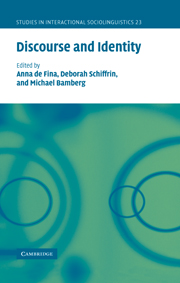Book contents
Introduction
Published online by Cambridge University Press: 09 November 2009
Summary
Background
Research on language and identity has experienced an unprecedented growth in the last ten years. The time when scholars in the field needed to advocate for the centrality of language in the study of identity (see for example, Benveniste 1971 in linguistics or Bruner 1990 in social psychology) seems far away indeed. Research in fields as diverse as anthropology, linguistics, psychology, sociology, history, literature, gender studies, and social theory, among others, has now firmly established the fundamental role of linguistic processes and strategies in the creation, negotiation and establishment of identities. It is impossible to give a comprehensive view of the theoretical work in all of these areas and of how it has shaped identity studies. Our aim with this introduction is more modest: we want to briefly discuss some of the approaches and concepts that have had the greatest impact on current visions of identity, beginning with background perspectives and then turning to central constructs underlying the chapters in the volume. We then present an overview of the volume and a conclusion recapitulating some of the common ground among the contributors.
Background perspectives
Here we describe several approaches to the study of discourse and identity that pervade the chapters in the volume. We begin with those that have become widely accepted in research on discourse and identity and conclude with some that produce potential divisions in the ways scholars examine discourse and identity.
- Type
- Chapter
- Information
- Discourse and Identity , pp. 1 - 24Publisher: Cambridge University PressPrint publication year: 2006
- 40
- Cited by



